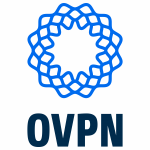OVPN Review (2024): A Privacy-First VPN From Sweden
OVPN was founded in 2014 in Sweden. According to the founders, they created the VPN because they believe everyone deserves privacy online without experiencing constant surveillance. Their goal, so they claim, is to be the most trustworthy VPN provider on the market.
For instance, they state that they intend to always maintain their headquarters in Sweden to avoid confusing rule changes regarding privacy and data retention. They point out that not every VPN provider shows the same commitment, with a lot of them relocating to tax havens over the years.
Moreover, they own all of the hardware and infrastructure for offering the VPN service. They also publish monthly transparency reports.
OVPN claims to offer incredible speeds, a high degree of security, and excellent customer service. They also state they don’t log any customer data and let you unblock streaming services.
The above does sound pretty good. But are all of these claims justified? Let’s find out!
| 💵 Price | From $4.22 a month |
| 📱 Operating systems | Windows, Mac, iOS, Android, Linux |
| 💻 Connections | 6 |
| 💳 Payment methods | PayPal, Other, Credit card, Cryptocurrency |
| 🔒 Protocols | OpenVPN, WireGuard |
| 📥 Torrent options | Torrenting allowed |
| 📅 Money-back guarantee | Money-back guarantee, 10 Days |
| 📋 Logs | Zero logs |
| 🎬 Works with |
|
OVPN Review: A Quick Overview
Here’s a brief overview of what OVPN has to offer and where it lacks:
| Pros | Cons |
|---|---|
| Firm no-logging policy | No 24/7 live chat |
| Hardly any speed loss | Few servers and server locations |
| Great encryption | Netflix is not currently compatible with this VPN |
| Offers a kill switch | Fairly expensive (comparatively) |
| Easy to install | Location change when using IPv6 protocol and multi-hop |
| Offers multi-hop and dedicated IP options | |
| Servers are optimized for streaming | |
| Very transparent | |
| Offers a great degree of anonymity |
Speed: Just How Fast is OVPN?
Selecting a fast VPN is important if you want a seamless browsing experience. After all, low speeds are an issue for doing almost anything online, and even more so for streaming, torrenting, or downloading large files. As such, we tested OVPN’s speed thoroughly. From our results, we can conclude the following:
- OVPN offers excellent speeds for day-to-day use and it’s a good choice for casual users.
- When we used a local server (in the Netherlands, since that’s where we’re based) we hardly noticed any speed loss.
- We were able to upload, download and stream content, browse the web, and play multiplayer games without any major issues.
Speed test results for OVPN
To give you a reliable indication of OVPN’s speeds, we measured our speed using both a local server (a Dutch server, in our case) and a server that is much further away (this was a server in the United States).
Of course, we also included a measurement of our normal connection’s speed (without a VPN). That way you’ll see exactly how much OVPN slowed our connection down. Remember, a bit of speed loss is inevitable when using a VPN.
| Connection type | Ping (ms) | Download speed (Mbps) | Upload speed (Mbps) |
|---|---|---|---|
| Without a VPN | 14 | 92.96 | 30.82 |
| Using a local OVPN server | 26 | 91.33 | 29.25 |
| Using a distant OVPN server (in the US) | 102 | 64.47 | 29.46 |
OVPN offers multiple servers in the Netherlands and the United States. OpenVPN’s app automatically informs users of the fastest server available per country. These are the servers we chose for our research.
Connecting to a local VPN server
As you can see in the table, both the upload and download speeds remained virtually identical when we used a local OVPN server.
Moreover, when we actually tested this server for day-to-day online activities, such as browsing, streaming, and downloading. There wasn’t any noticeable loss in speed. It’s really impressive.
It doesn’t happen often that a VPN has (virtually) no effect on one’s speed, even when using a local server.
Connecting to a distant OVPN server (United States)
When we connected to a server that was far away from our office, we did notice a drop in speeds. This is to be expected when one’s data has so many extra miles to travel. First, we noticed a major increase in ping.
For a lot of activities, this isn’t even a huge problem, however. It’s mainly something that can be an issue when gaming, or during other activities that require instant feedback because of interaction between different users.
Remarkably, the upload speed when connected to a US server was even higher than with our local server and is virtually identical to our normal connection’s upload speed (without a VPN). The download speed did dip quite a bit (about a third). However, during day-to-day use, this didn’t seem as much of an issue.
Speeds during daily use
Numbers are great to an extent. But the most important thing is to what degree a VPN’s speed drop affects your online experience. That’s why we tested OVPN to see how it impacts our browsing, streaming, downloading, uploading, and gaming experience.
Browsing and streaming
During normal web browsing, we noticed virtually no difference between our connection with or without a VPN. Especially the local server we tried didn’t affect our browsing experience at all.
When browsing with the US server, we did notice that some websites, such as Netflix, took slightly longer to load. However, we’re talking about a delay of no longer than a second here.
During our streaming test, we simply didn’t notice any meaningful differences in speed. Both the Dutch and American servers allowed us to effortlessly load movies and shows on Netflix. Moreover, the servers didn’t hamper our Youtube experience at all.
Downloading and gaming
We also tested downloading files. This wasn’t an issue for OVPN either. We managed to download relatively large files quickly. We also uploaded some files to see how OVPN performed in this regard, and it passed with flying colors.
In fact, we were even able to upload several files simultaneously without any issues. This is in line with what we expected based on our speed tests.
Lastly, we used the VPN for some online gaming. Graphically intensive games performed just as well, and there wasn’t much of an issue. In some cases, we noticed a dip in latency, but that’s to be expected when there’s a lot going on screen.
However, we didn’t face any noticeable speed issues, and, remarkably, the high ping didn’t prove game-breaking. But of course, please note that circumstances, as well as specific games, differ, so we can’t guarantee you’ll have exactly the same experience as us.
Safety – How Secure is OVPN?
The security and privacy a VPN offers are arguably the only things that are more important than its speed. After all, many people use a VPN (among others) to protect their privacy and their data. Many third parties can access your data, so it’s important that you protect it as much as possible.
OVPN claims that security and privacy are paramount to them. They say they protect their customers’ data and don’t log any activity. We investigated just how secure and anonymous OVPN’s service is. These are our findings:
- OVPN is very transparent and open about how they provide their service. Every month they release a report on transparency.
- Their headquarters are in Sweden.
- OVPN uses the OpenVPN encryption protocol (UDP and TCP ports) and Wireguard (UDP ports). Both of these utilize strong 256-bit encryption, which is robust.
- OVPN has a no-log policy and doesn’t, so they claim, store any personal data or information about your online activities.
- In order to make an account, you only need a username and a password (not even an email address), which is great for privacy.
- OVPN has insurance that covers legal fees, to protect the privacy of their users in court if necessary.
- The VPN provider says it owns all of the hardware it uses and doesn’t use hard drives. They only use RAM servers.
- They regularly do DNS checks to prevent DNS leaks.
- OVPN also has a built-in kill switch.
Encryption protocols
OVPN uses powerful 256-bit AES encryption, just like popular premium VPNs like NordVPN and Surfshark. AES-256 is considered quantum-resistant, so even quantum computers are thought to be unable to break it.
OVPN offers two encryption protocols, which you can choose from yourself in the app. The options are:
- OpenVPN: OpenVPN is generally considered to be the very best VPN protocol as far as privacy and security go. It also offers great speeds. This protocol supports two different ports: TCP and UDP. The latter offers higher speeds, while the former generally ensures a more reliable connection.
- Wireguard: This protocol is relatively new, at least compared to more established protocols like OpenVPN. Wireguard is often praised for the high speeds it can achieve and its solid security. However, it’s not the best choice for privacy, as it needs to register users’ real IP addresses and use timestamps in order to assign them static IP addresses.
When you log into your OVPN account for the first time, it will select the OpenVPN UDP protocol. During our tests, this protocol proved to be just as fast as the Wireguard protocol. The TCP OpenVPN variant did prove to be a fair bit slower, but that’s only because it offers more security.
Logging and privacy
OpenVPN claims to be a very privacy-oriented VPN. According to the service, its entire infrastructure is built around its core principles of privacy and security. As such, the provider says they don’t log any of the following user data:
- Data traffic
- Timestamps
- DNS-requests
- IP-addresses
- Mac-addresses
- The amount of bandwidth consumed
OVPN has successfully defended themselves in a lawsuit before, in which they fought for their users’ right to privacy, by arguing against a request to provide user data. The litigation lasted for two months.
Apparently, OVPN won the case because of its no-logging policy. The service claims never to have given any user information to third parties.
Whenever you connect to the VPN client, connection logs will automatically be stored on your device. These logs contain information about connection attempts and other technical information. These logs are only available to the user: they cannot be accessed by OVPN.
What data does OVPN collect?
The fact that OVPN has a no-logs policy doesn’t mean that they don’t collect any information. After all, a few important details are necessary to provide their service. OVPN is very transparent about this and about what data they gather.
This is the information that OVPN collects:
- Username, password, and email address (providing an email address is optional)
- The date and time when the account was created and when it was last updated
- Whether the user subscribed to OVPN’s newsletter
- Whether the user has ever successfully logged into the desktop client, has ever successfully connected to a VPN server, whether they received an IPv6 address if they enabled “compression OpenVPN” and whether they enabled anti-geo-restriction measures (for streaming)
- The language and currency on the website
- The country which the user signs up from (note that, although this information is retrieved from the user’s IP address, the IP itself is not stored)
- Number of connected devices
- The end date of the subscription and the Public IPv4 and Multihop add-on
- The current version of the OVPN client and browser extension you’re using
In short, OVPN doesn’t store any information about where (exactly), how, and when their customers use the VPN.
If you want all of your data to be removed from their servers, you can simply contact them and one of their employees will manually delete all of your data. This process could take up to one month. Do note that this will result in the termination of your account.
Safety features
According to OVPN, they own all of the hardware that is used as part of their service and store this safely. As for the OpenVPN protocol, the syslogs are turned off to make sure no logs are stored within the RAM memory of OVPN’s servers.
Regarding Wireguard, this protocol requires storing IP addresses on a server to work correctly. Nevertheless, OVPN also takes safety measures to combat this privacy issue: straight after you finish your VPN session, they remove the stored IP address from their servers.
Moreover, it’s impossible to access OVPN’s servers using a console, keyboard, or a USB-connection. The provider also has insurance to cover legal fees. This way, OVPN has a way of defending itself from information requests about its users.
OVPN also offers DNS-leak protection. The client has an automatic feature that changes the settings of your device’s network adapter, meaning OVPN’s DNS servers will be used to obtain your destination page’s IP address.
This will protect you from having your DNS requests leaked to your ISP’s DNS servers. The changed settings are checked and verified every second to prevent any changes coming from recently installed software, for instance.
The only reason we could somewhat fault OVPN’s privacy and security is the fact they’re based in a 14-eyes country. This refers to an alliance, which Sweden is a part of, which enables easy sharing of (sensitive) data of citizens between the member states.
However, considering the strong privacy measures OVPN takes, and the fact they are a no-logs VPN, it remains to be seen how problematic this really is.
Kill switch
As any safe VPN provider should, OVPN has a kill switch. What this does is turn off your internet connection when your VPN connection is interrupted, for whatever reason.
This way your data remains safe and doesn’t fall in the wrong hands when your connection is interrupted. OVPN also offers a verification method to check if the kill switch is working as it should on their website.
What information does OVPN require?
OVPN doesn’t require any personal information for you to make an account. You can use the service very anonymously. In fact, when you create your account, you don’t even need to provide an email address (although you can if you want to). You only need a username and a password.
OVPN explicitly mentions they don’t store payment information on their servers. They offer various payment methods, which we’ll get into later. You can also pay via cash or via crypto if you want.
Transparency
OVPN prides itself on its transparency. The service clearly states which third parties they work with and why. Moreover, they openly share various technical details on the hardware and operating systems they use.
On their website, you can find what hardware they use for which server locations, how these systems work, where the data centers are located, and more information. They even went as far as to include a picture of the VPN servers they use for every location.
The transparency reports will tell you how many DMCA requests (for copyright infringement) the service received that month, the uptime of the servers, and the volume of data encrypted. You’ll also find out how much traffic each server received and what their maximum capacity is.
These reports even allow you to see the amount of encrypted data and the uptime of each individual data center.
Usability – How User-Friendly is OVPN?
The OVPN software is easy to navigate and very well-designed. Without being all cluttered up, the client gives you all the information you need. .
Therefore, we tested just how user-friendly the OVPN software is. To do so, we had a look at easy-of-use, the client’s and website’s appearance, pricing, the installation process, and OVPN’s customer service. These are our findings:
- Both the website and the OVPN app are easy-to-navigate and simple to use.
- OVPN offers useful guides for installing its apps on supported operating systems.
- OVPN’s service is available on many operating systems.
- All of the subscriptions include a 10-day money-back guarantee.
- The customer service is easy to reach and knowledgeable.
- You can pay by credit/debit card, PayPal, cash, or using several cryptocurrencies (Bitcoin, Ethereum, or Monero).
- The software is only available in English.
Website
OVPN’s website looks pleasant and neat. They provide a lot of information, without cluttering up their website and presenting too many elements that might get confusing for the less tech-savvy. The website’s standard language is English, but it’s also available in German, Norwegian, and Swedish.
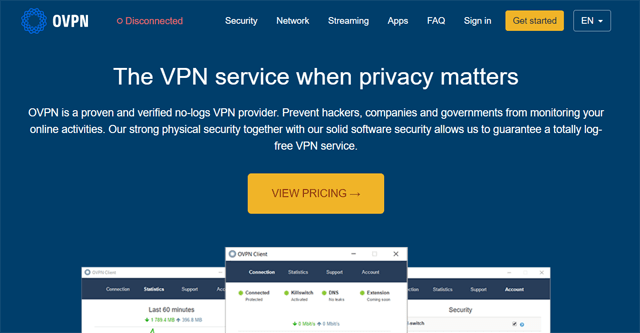
To help speed things along, there’s a button in the top right corner of the homepage taking you straight to OVPN’s subscriptions. When you scroll down, you’ll find lots of useful information on the VPN.
Once you log on to your account (if you have one already), you’ll find the account page neatly presented too. You’ll find information regarding your account and subscription, including options to upgrade your plan.
The only thing we could really fault the website for is that there were some things we found in the FAQ we weren’t able to find on the website. An example would be the option to refer a friend and get bonus time on top of your current subscription. We weren’t able to find this information in the section on subscriptions or on the homepage.
Installation process
Even though OVPN’s installation struck us as easy and straightforward, they offer useful guides on installing the client on different devices and operating systems. To install the software on a Windows PC, follow these steps:
- Go to OVPN’s website.
- Click on the yellow “Get started” in the top right corner.
- Choose a subscription. We’ll elaborate on the options down below.
- Create an account. You’ll have to choose a username and a password. Giving your email address is optional.
- Choose your payment method and pay for your subscription.
- Download the VPN client.
- Install the client. To do so, simply follow the indicated steps.
- Log in to the app.
- Connect to the server of your choice.
Here are all the operating systems on which you can run OVPN:
| Devices | Operating Systems |
|---|---|
| Desktop | Windows, macOS, Ubuntu, Debian, Manjaro, Raspberry Pi, FreeBSD, CentOS, Fedora. |
| Phones and tablets | Android, iOS. |
| Routers | AsusWrt, DD-WRT, EdgeOS, OpenWrt, OPNsense, Tomato, pfSense, Vilfo. |
| Other devices | Asustor, FreeNAS, Synology NAS, QNAP. |
OVPN also offers browser extensions for Google Chrome and Mozilla Firefox.
Appearance and user-friendliness of OVPN’s software
Just like the website, the software interface is also straightforward. The app only have a limited number of menus and tabs, making it easy to find whatever you’re looking for. The software is only available in English.
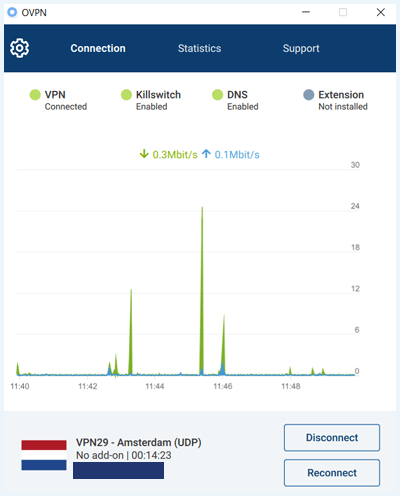
By clicking on the “Connection” tab, you’ll find servers to connect to. The app will automatically choose the best server in each server location. However, you can also choose a server manually.
We think the latter is a great extra feature because it offers some additional unblocking possibilities (more on this later) if one of the servers doesn’t work with a particular streaming service, for instance.
By clicking on “Statistics” you’ll find some information about your connection for the past hour and the past 24 hours. If you go to “Support” you can send an email to customer service. You can also include technical logs so they’re able to assist you better.
Don’t worry, these are only saved on your device and OVPN will only get them if you agree to this.
When you click on the Settings icon (the little gear), you’ll get to see a few icons on the left-hand side. If you click on one of these icons, you’ll get more options. For instance, if you click on the protocol icon (see the screenshot down below) you can change your protocol or related settings.
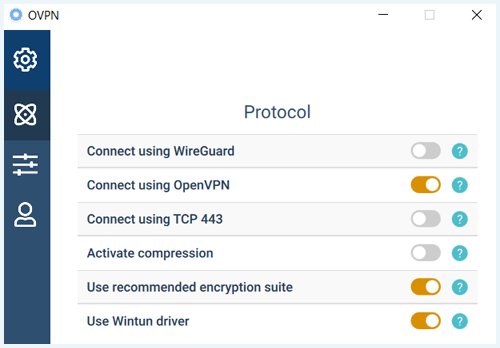
The general menu offers several options, among which are the kill-switch option and several others. What’s quite useful, is that behind all those options you’ll find a little question mark. If you click on these, the software will refer you to information on these options that you can find on the website.
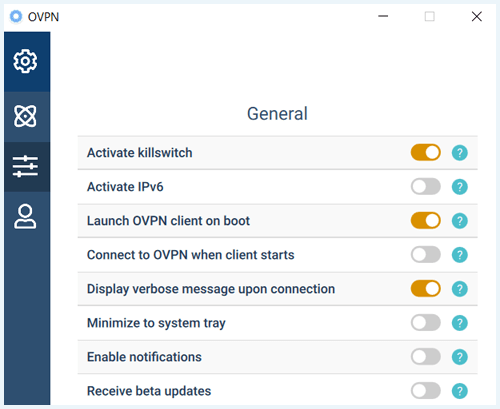
Finally, there is an account menu, which shows you your username and your subscription and allows you to log out.
IP address change when using IPv6
When using the OVPN app, we encountered some issues when using IPv6 (the latest version of the internet protocol as we know it) together with the OpenVPN protocol. We enabled IPv6 and connected to a Dutch server.
When we checked our virtual location and IP address, we seemed to have gotten a Swedish IP address all of a sudden. As a result, we weren’t able to watch any of the local streaming content that we were used to on Netflix and other streaming platforms.
When we used the Wireguard protocol, we didn’t have this issue. This also didn’t happen when we disabled IPv6.
On a positive note, apparently, OVPN was aware of this issue. Their customer service informed us this had to do with the fact that we had an active Multihop add-on (an extra option which we’ll get to later). Apparently, the exit server of this add-on (the last server your traffic passes on its way to the destination server) is in Sweden.
They assured us this issue didn’t pose any privacy issues, which we’d have to agree to. After all, your real IP address is hidden regardless. However, it’s still something to consider, as this might have some consequences when unblocking content is concerned, such as the problem we ran into.
Pricing and payment methods
As of writing, OVPN offers four different subscriptions, with the cheapest one costing $4.22 per month and the most expensive one costing $11 per month.
The subscriptions differ regarding price, duration, the maximum number of connected devices, and whether or not Multihop is included. Below you’ll find all of the subscriptions:
- 36-month subscription: This subscription costs you $4.22 a month (when you convert from biannual payment). It allows for a maximum of seven connected devices and includes a free Multihop add-on. If you weren’t convinced yet, this subscription also includes an OVPN T-shirt!
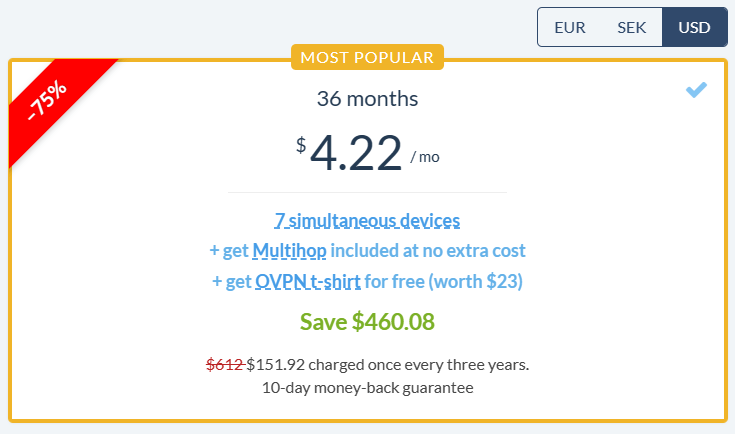
- 12-month subscription: This subscription also costs $4.99 monthly. Contrary to the 24-month subscription, this one only allows for five simultaneous connections. However, it does also include the Multihop add-on.
- Six-month subscription: This subscription costs $6.99 a month, allows for four connected devices, and includes the Multihop add-on.
- Monthly subscription: This subscription costs $11 per month and as such can be cancelled monthly. If you plan to hold on to your subscription for a while, it’s actually the most expensive subscription. You can connect four devices at once, but it doesn’t include the Multihop add-on.
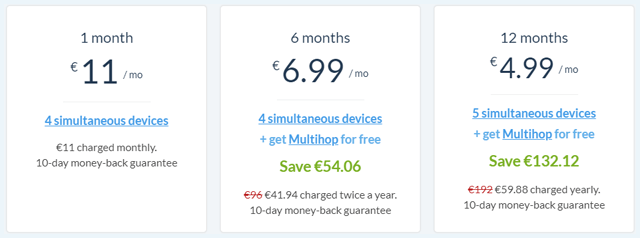
All subscriptions come with a 10-day money-back guarantee. Do note that this doesn’t apply if you pay in cash.
OVPN offers the following payment methods:
- Credit card: Visa, Mastercard, Maestro, Discover, JCB
- PayPal
- Crypto: Bitcoin, Ethereum, Monero
- Cash
When you choose to pay by cash, you will receive a code that is unique to your order. When you send your cash to OVPN’s headquarters in Sweden, you have to include this code in the envelope.
As soon as they have verified and received your payment, you’ll receive an email and your subscription will be added to your account. This process can take up to five days (after your payment has been received).
By using cash or cryptocurrency to pay for your subscription, you can greatly anonymize this whole process.
Note: Although paying the old-fashioned way, by cash, can be great for privacy, it’s not always the most secure payment method. After all, the likelihood of money going missing this way is inevitably higher than when using a safe online payment method.
Customer service
OVPN offers a live chat. Unfortunately, this chat is not available 24/7 like with many large VPN providers. In fact, we were not able to find the times within which their customer service operates. The live message window only informs you when you can expect to speak to someone.
If it’s late (European time), you might just get told someone will be available to help you “tomorrow.” Of course, you can always send them an email through their contact page or just come back later.
Nevertheless, we would have liked to see a bit more professionalism here. Also, if they expect to have users all over the world, it might be good to think about different time zones and the fact that limited hours might make it difficult for some clients to get the help they need.
However, this is where our criticism stops. Because honestly, when the customer service is online, you can generally expect a very fast reply. According to their website in under 20 minutes.
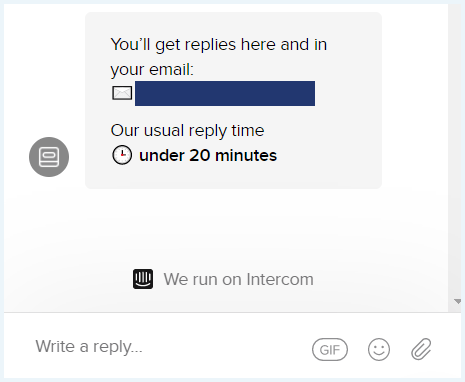
In fact, when we contacted them on two completely separate occasions, they answered virtually immediately. Moreover, they helped us promptly with our queries and were very knowledgeable. In other words, it seems they could still improve as far as availability goes, but we conclude that the quality of their customer service personnel is great.
OVPN’s Server Network
As one of the most important aspects of a VPN provider, we also extensively analyzed OVPN’s server network. These are our main findings:
- OVPN currently has 98 servers, spread out over 29 cities in 19 countries in Europe, North America, and the Asia-Pacific region. This number of servers and countries is quite small.
- You can just connect to a server location and have OVPN choose the fastest server. However, they also allow you to select a server manually.
- You can enable streaming, which will cause OVPN to send your data through different servers which are optimized for streaming.
Number of servers and locations
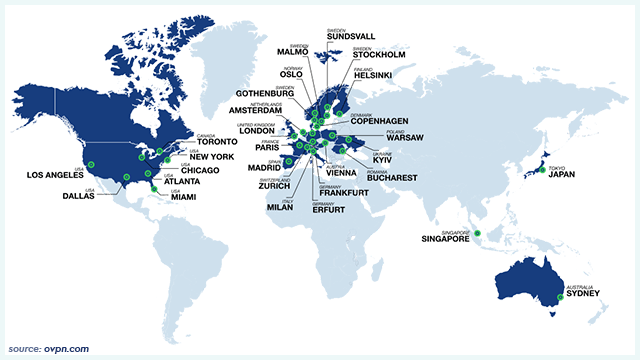
OVPN only offers 98 servers, which isn’t that much. As a comparison, our current number one VPN, NordVPN offers over 5000 servers in 60 countries.
OVPN claims they have few servers because of their high demands regarding security and privacy. They also state they value quality and safety more than “quantity and marketing.”
We understand this sentiment. However, more servers, and especially more server locations, can definitely offer advantages, especially if people want to unblock certain (streaming) content that’s only available in certain countries.
Moreover, if someone cares a lot about privacy but also about good internet speeds, it could be problematic if the nearest VPN server is very far away from where they live. For this reason, we do think it would be great if OVPN could improve on this front.
You’ll find all of OVPN’s current server locations in the table below.
| Continent | Countries and Locations |
|---|---|
| Asia | Japan (Tokyo), Singapore (Singapore) |
| Europe | Denmark (Copenhagen), Germany (Erfurt, Frankfurt, Offenbach), Finland (Helsinki), France (Paris), United Kingdom (London), Netherlands (Amsterdam), Norway (Oslo), Ukraine (Kiev), Austria (Vienna), Poland (Warsaw), Romania (Bucharest), Spain (Madrid), Sweden (Gotenborg, Malmö, Stockholm, Sundsvall), Switzerland (Zürich) |
| North America | Canada (Toronto), United States (Atlanta, Chicago, Dallas, Los Angeles, Miami, New York) |
| Oceania | Australia (Sydney) |
All of the OVPN servers seem to work well. We didn’t run into any issues regarding speed or inconsistency in server locations.
OVPN doesn’t offer servers that are specifically optimized for P2P, i.e. downloading torrents. However, they do allow torrenting on their servers, as they state it’s not up to them to decide what traffic goes through their servers.
They do offer a specific option to unblock streaming services from a country where these normally wouldn’t work. You can enable this option in your account on the website or within the desktop client.
Consequently, your data traffic that goes to the streaming services will go through special servers that are optimized for streaming. Your other traffic will still go through OVPN’s “normal” VPN servers. This way you can circumvent streaming blocks with OVPN.
OVPN’s Options
Apart from the more “standard VPN aspects,” such as security and privacy, speed user-friendliness, and available servers, we also checked out the extra options that OVPN offers.
For instance, does OVPN allow you to watch the US version of Netflix (worldwide) and other blocked streaming content? Does it allow you to download torrents? What extra features does OVPN offer? Here’s what you need to know:
- Netflix currently seems to block OVPN servers. However, we were able to access the other streaming platforms that OVPN claims to unblock.
- OVPN offers dedicated IP addresses, or as they call them, public IPv4 addresses for $3 a month.
- OVPN also offers a Multihop add-on, which is actually included in the majority of their subscriptions.
Dedicated IP address
Although OVPN’s terminology is a bit different, they offer a solution that, as far as we understand, is identical to a dedicated IP address. This is their “public IPv4” add-on. This add-on allows you to use the same unique VPN IP address every time you connect to OVPN.
No one except you will be able to use this specific IP address for as long as your add-on subscription lasts, or until you change this address yourself. You can do so every 14 days if you want to. This add-on costs $3 a month.
Multihop
Multihop is the other add-on that OVPN offers. This feature will actually take your data traffic through two different VPN servers in two different cities (and often even countries) and add an extra layer of encryption. This greatly increases your privacy.
The Multihop add-on costs $5 if bought separately, but is actually included with most OVPN subscriptions. If you’d rather have a Multihop feature that goes through not two, but up to four different servers (for extra anonymity), you might want to have a look at Perfect Privacy VPN.
OVPN and Netflix
OVPN claims to unblock the following streaming services worldwide: C More, TV4 Plat, SVT Play, Viaplay, play, HBO Nordic, the Swedish, American and German versions of Netflix, NRK Play, Hulu, the American Amazon Prime Video, Disney Plus, and HBO Max.
Even though OVPN mentions they are actively trying to find ways to circumvent Netflix’s geo-restrictions, we weren’t able to access the US version of Netflix using their servers.
When we inquired about this with their customer service, OVPN stated their IP addresses are currently being blocked by Netflix. Netflix and other streaming platforms have tried blocking VPN users for a long time, so this doesn’t come as a complete surprise. OVPN says they’re working on the issue.
We were able to access the other streaming services that OVPN mentions using their service. In fact, we even accessed some streaming services which are not on their list, such as Shudder.
OVPN and torrenting
OVPN doesn’t offer special P2P servers for torrenting, as some other VPN providers, such as Surfshark do. We tested downloading (non-copyrighted!) torrents using OVPN and this turned out to be quick and easy. In other words, OVPN does allow for torrenting.
Our Experience With OVPN
At first, we had our doubts regarding OVPN’s big promises. After all, it’s quite rare for VPNs, especially smaller ones that aren’t that well-known, to perform great when it comes to privacy and security, speed and convenience, and unblocking.
The fact they allow very anonymous use of their service (you need very few details to sign up for an account and can pay by crypto) is also a huge plus. We are also impressed they take so much responsibility for all the hardware they own and all their data centers, this is not something we always see with larger VPNs for instance.
Apart from their strong focus on privacy and security, OVPN also offers impressive speeds and a high degree of convenience. Nevertheless, there are still some OVPN characteristics we consider to be sub-optimal.
For instance, we disagree with OVPN’s seeming suggestion that a large number of servers and server locations is just good for marketing. We believe it also helps to make more content (from different countries) available to VPN users and can actually help improve speeds. Therefore, we’d like to see them expand their server network in the future.
Also, the fact that users won’t be able to access the US version of Netflix could very well be a deal-breaker to some, because of its worldwide popularity.
Lastly, we do think OVPN’s price is on the higher side, especially considering their limited number of servers and server locations. Nevertheless, thanks to the great privacy and security precautions that OVPN takes, and their fast servers that allow for a pleasant and safe browsing, streaming, and downloading experience, we are still very impressed with this provider.
Do you have a specific question about OVPN that you need an answer for fast? Check out our FAQ down below to see if we’ve already answered your question. If we haven’t, feel free to leave us a comment down below and we’ll get back to you as soon as possible.
OVPN has proven to be serious about its users’ security and privacy. They don’t keep logs on user activity, use strong encryption protocols, and own all of their hardware themselves. Moreover, the service allows you to register and pay for your subscription anonymously. Read all about their safety measures in our extensive OVPN review.
OVPN uses special streaming servers that it claims can unblock the US, Swedish and German versions of Netflix. Unfortunately, when we tried to use Netflix with OVPN, we found that Netflix currently blocks these servers, which OVPN’s customer service confirmed. If you want to be sure your VPN can unblock Netflix, we recommend checking out our article on the best VPNs for Netflix.
OVPN is not a free VPN. They have several subscriptions. The one that offers the best value comes down to $4.99 a month. Note that free VPNs often have some serious flaws and limitations. However, if you still consider using a free VPN, we recommend checking out the best free VPNs.
OVPN offers four different subscriptions, which you can find below:
- 24 months for $4.99 a month
- 12 months for $4.99 a month
- 6 months for $6.99 a month
- 1 month for $11
Please note that, apart from the duration and price, these subscriptions also show some differences in features. Read our full OVPN review for more information.
Yes, OVPN offers dedicated IP addresses. The term they use is just a bit different: public IPv4 addresses. But just like dedicated IPs, these IP addresses are unique to one user and don’t change every time he or she logs in. They offer this feature as an add-on for $3 a month.
